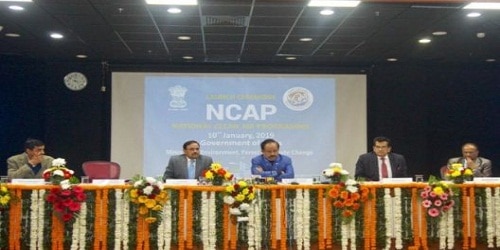On January 10, 2019, the Union Minister of Environment, Forest and Climate Change, Dr. Harsh Vardhan launched a nationwide strategy, to tackle implementation of air pollution, under the National Clean Air Programme (NCAP) in New Delhi.
 About the NCAP:
About the NCAP:
i. It will be a mid-term, five-year action plan with 2019 as the first year.
ii. It will be launched in the 43 smart cities falling in the list of the 102 non-attainment cities, under the Smart Cities program.
iii. Institutional Framework at Centre and State Level comprising of Apex Committee at the Ministry of Environment Forest and Climate Change in the Centre and at Chief Secretary Level in the States are to be constituted for implementation of the action plans of cities.
iv. Additionally, sectoral working groups, national level Project Monitoring Unit, Project Implementation Unit, state level project monitoring unit, city level review committee under the Municipal Commissioner and DM level Committee in the Districts are to be constituted under NCAP.
v. The respective ministries/institutions responsible for the institutionalization of NCAP are:
- Ministry of Road Transport and Highway, Ministry of Petroleum and Natural Gas, Ministry of New and Renewable Energy, Ministry of Heavy Industry, Ministry of Housing and Urban Affairs, Ministry of Agriculture, Ministry of Health, NITI Aayog, Central Pollution Control Board, experts from the industry, academia, and civil society.
About the targets and salient features of the NCAP:
Following states the national targets and the features of the NCAP as per suggestions available from the international experiences and national studies. They are:
- national level target of 20%–30% reduction of PM2.5 and PM10 concentration by 2024 taking 2017 as the base year for the comparison of concentration,
- Selection of 102 non-attainment cities identified with respect to ‘Ambient Air Quality India’ report of 2011-15 and WHO report of 2014-2018.
- monitoring stations in the country including rural monitoring stations would be increased,
- technology support, emphasis on awareness and capacity building initiatives would be provided,
- setting up of certification agencies for monitoring equipment, source apportionment studies, emphasis on enforcement, specific sectoral interventions etc. would be promoted.
102 cities chosen for the implementation of NCAP:
i.The states concerned with the implementation are 23 in number and following shows the details of respective districts in an ascending order of number of districts allotted under the programme per state:
| Number of districts allotted (in ascending order) | State/s |
| 1 (Lowest) | Chandigarh, Delhi, Jharkhand, Meghalaya, Tamil Nadu, West Bengal |
| 2 | Uttarakhand, Jammu & Kashmir, Nagaland, Gujarat |
| 3 | Bihar, Telangana, Chhattisgarh, |
| 4 | Karnataka |
| 5 | Andhra Pradesh, Assam, Rajasthan |
| 6 | Madhya Pradesh, Orissa, |
| 7 | Himachal Pradesh |
| 9 | Punjab |
| 15 | Uttar Pradesh |
| 17 (Highest) | Maharashtra |
Background:
3% of the land, but contribute to 82% of GDP and responsible for 78% of Carbon dioxide emissions.
Central Pollution Control Board (CPCB):
Headquarters: New Delhi.
Ministry of Environment, Forest and Climate Change:
♦ Union Minister: Dr. Harsh Vardhan.
♦ Minister of State: Dr. Mahesh Sharma.

